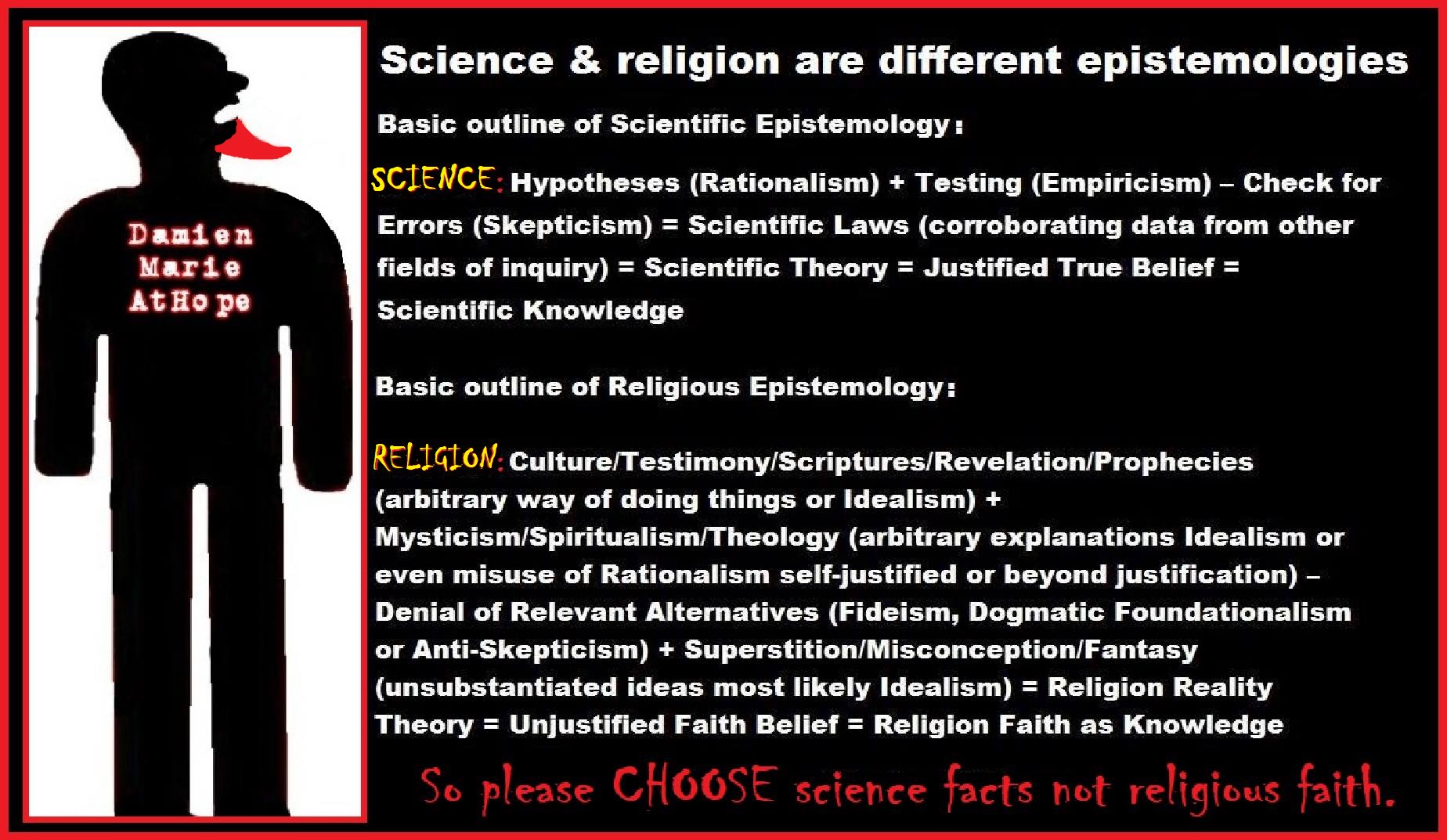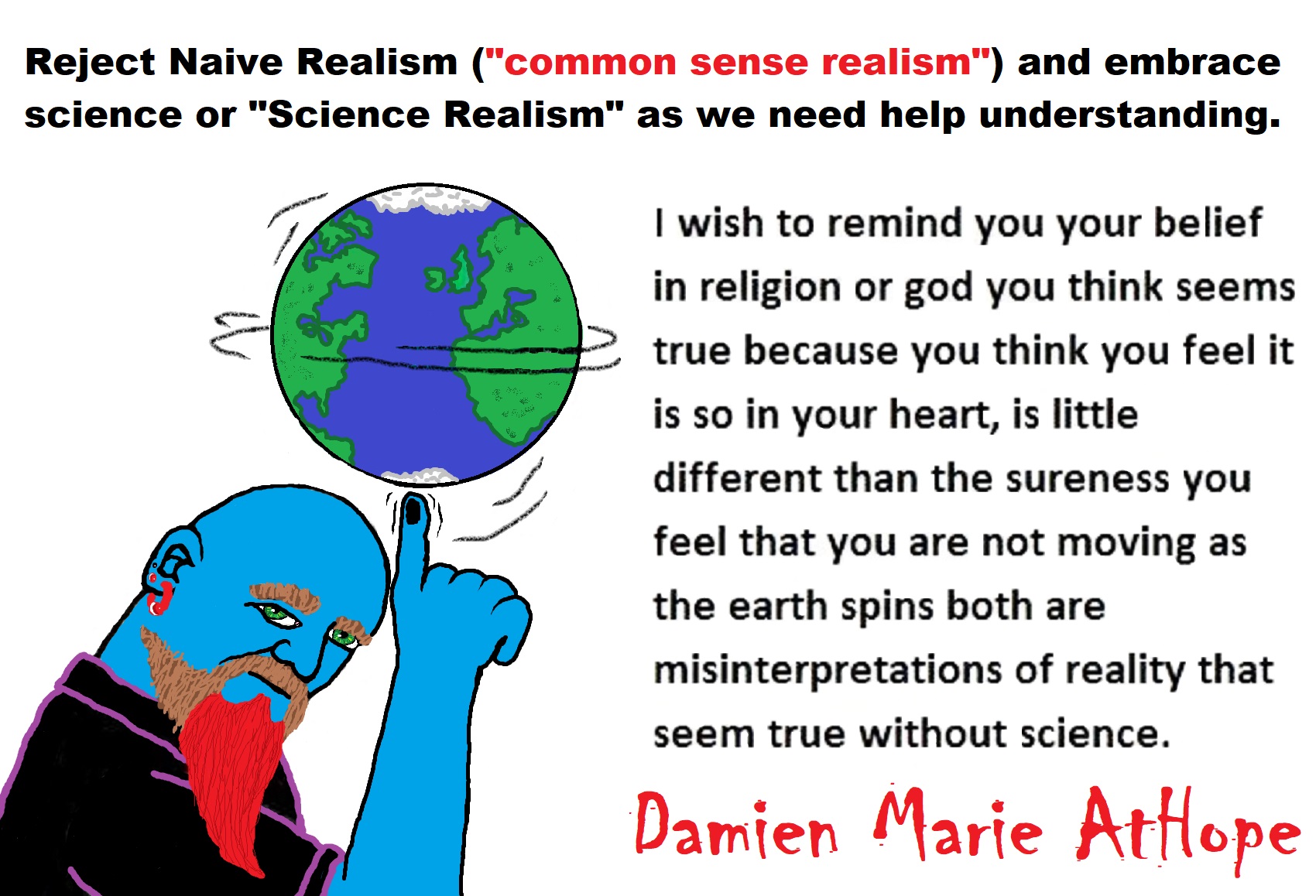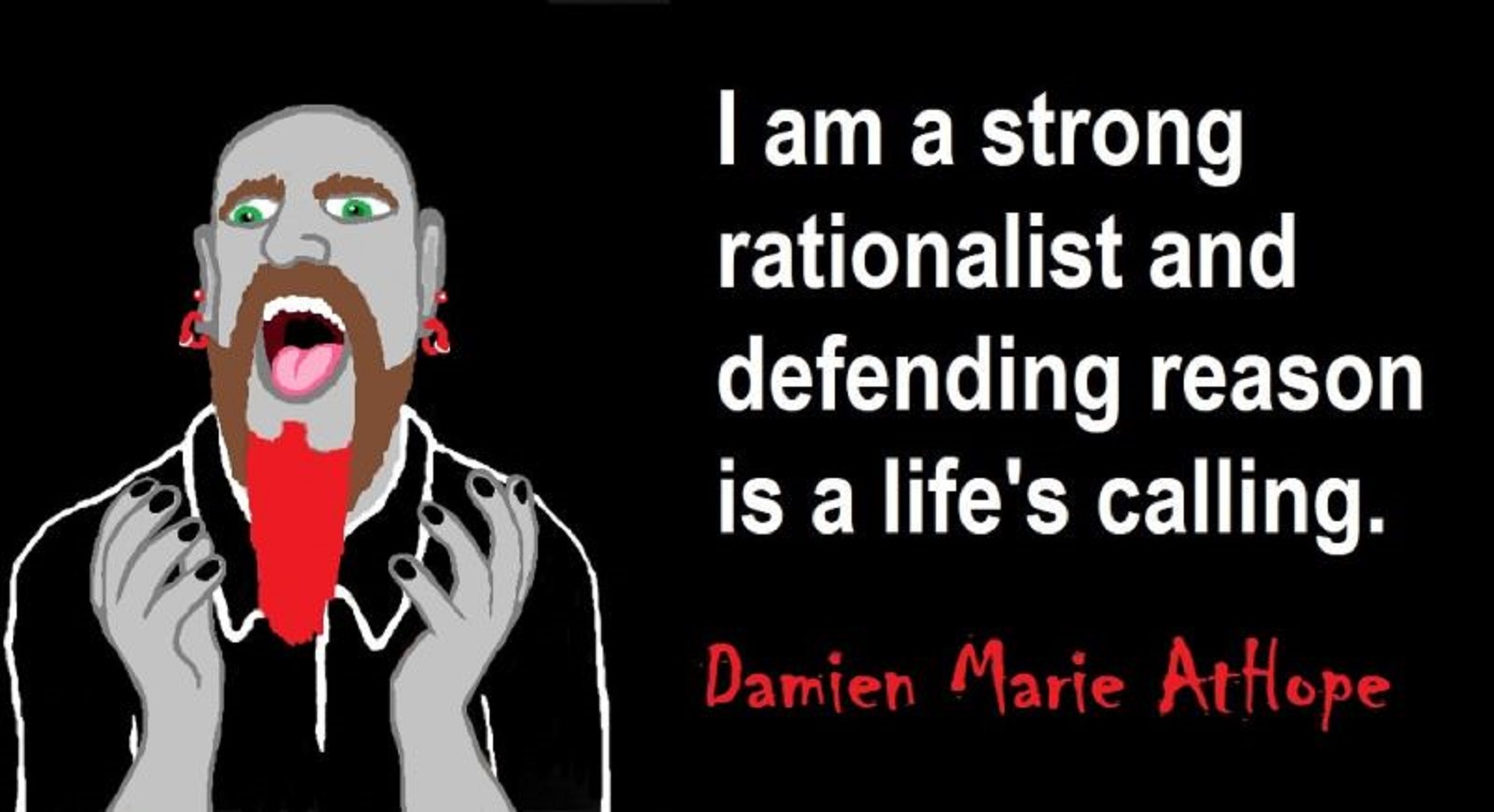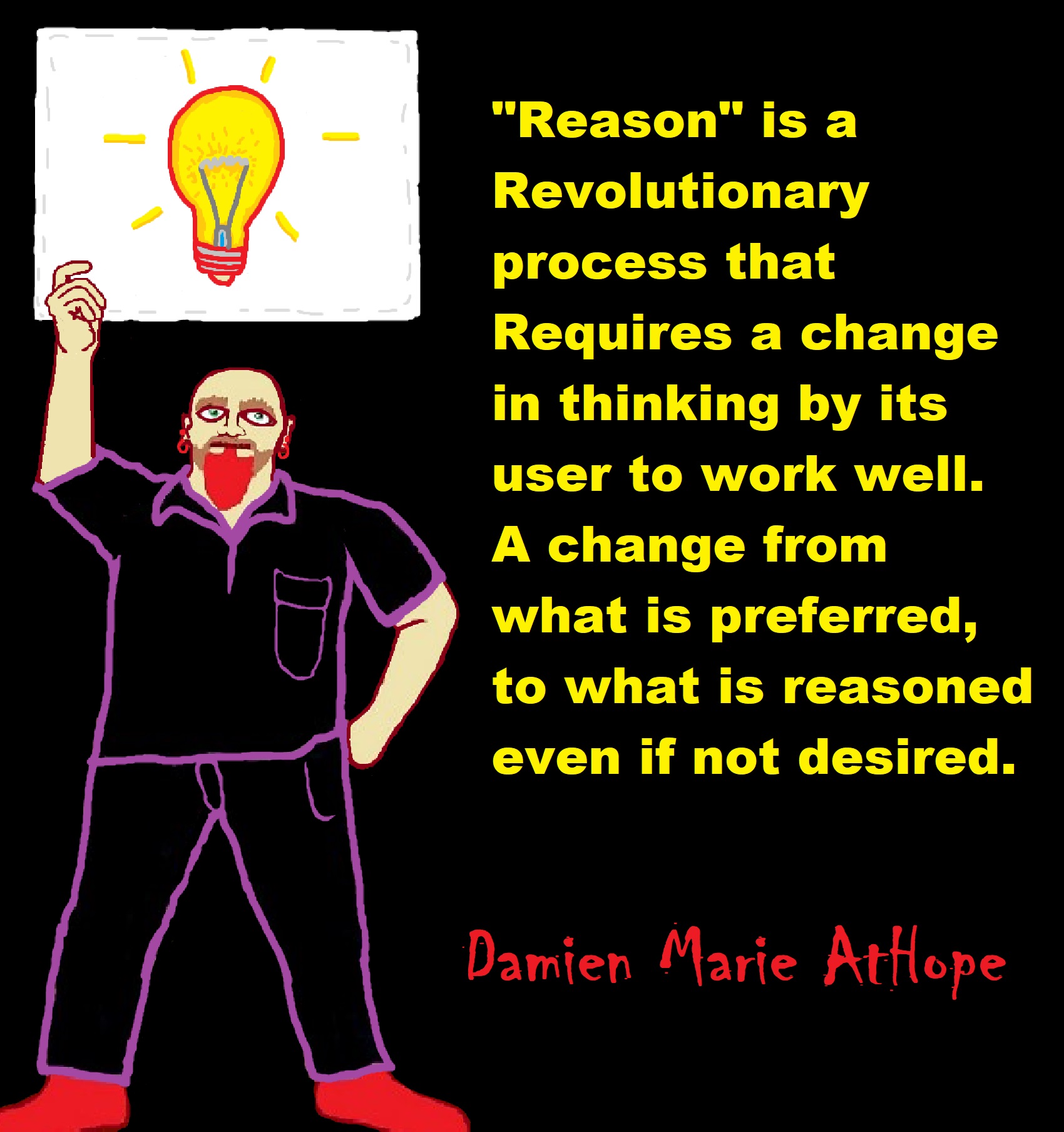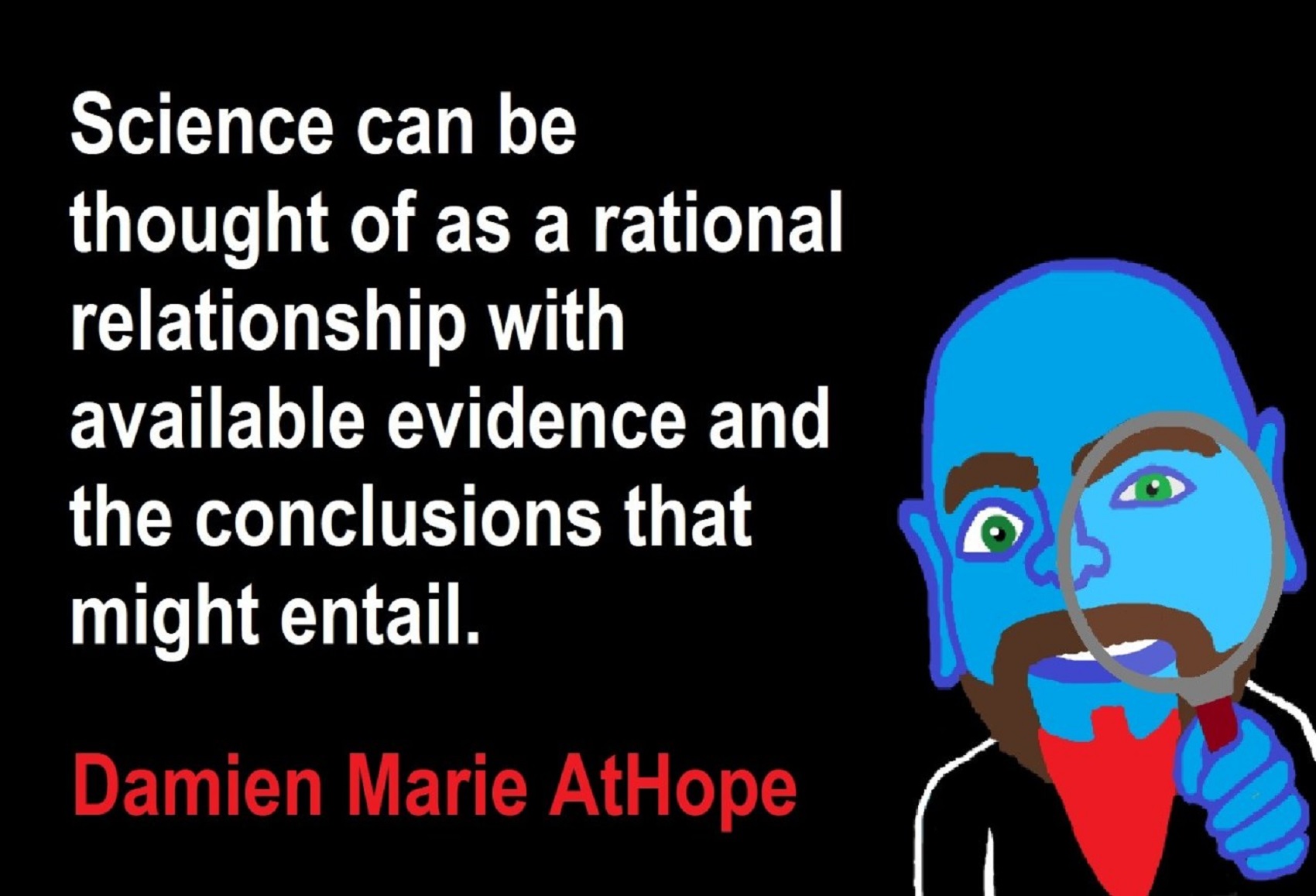
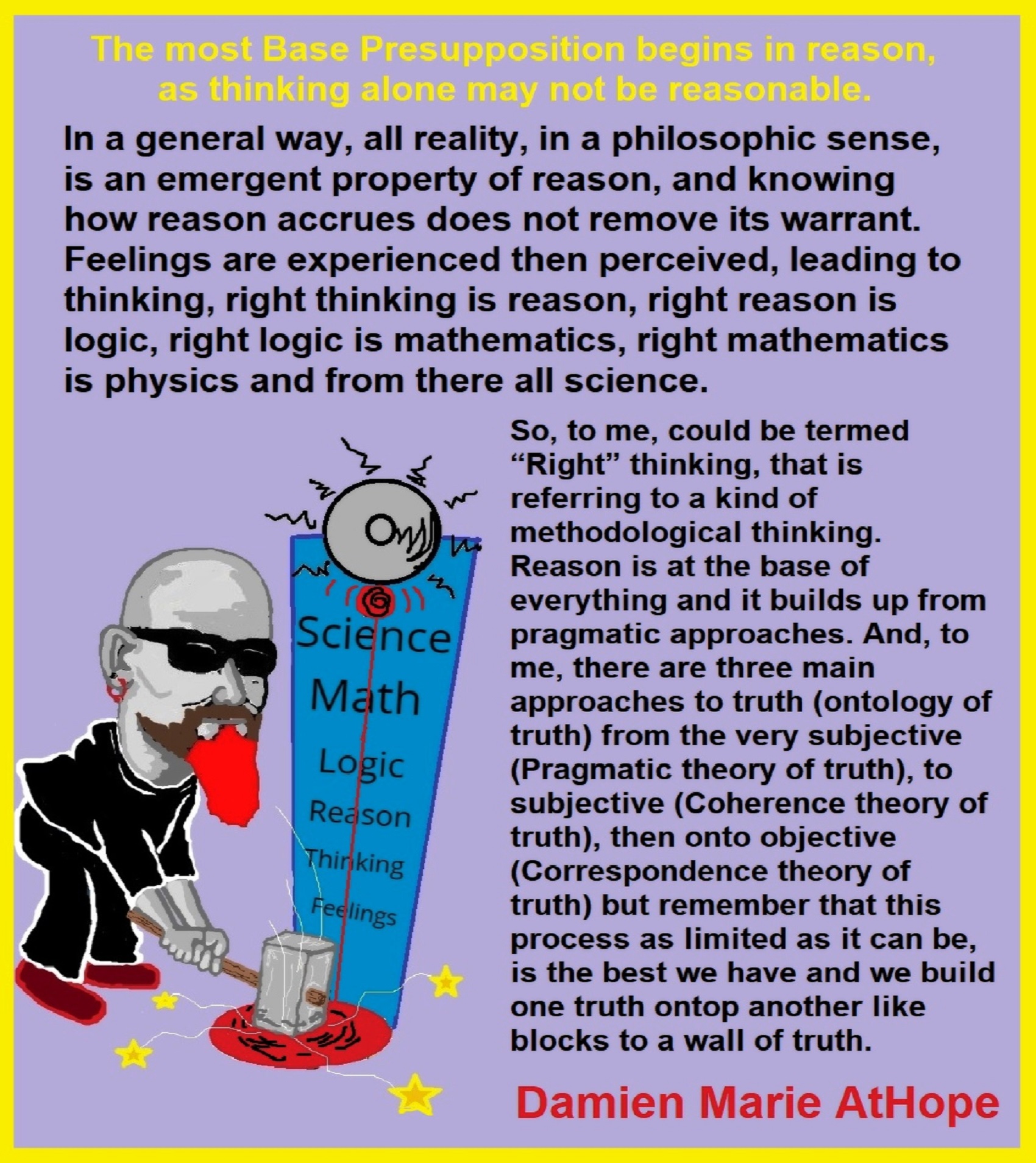
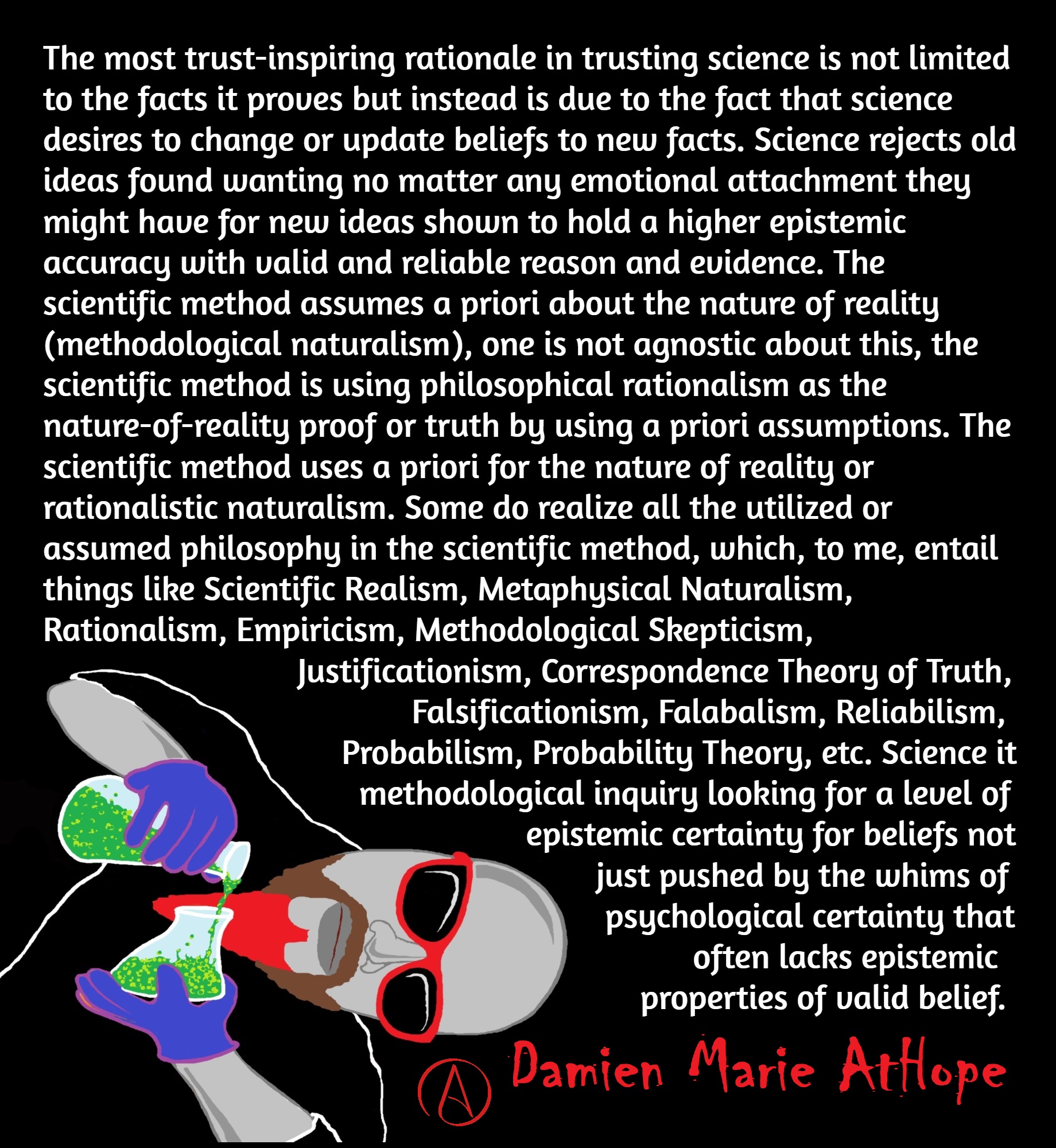
Science is quite the opposite of just common sense.
Science is quite the opposite of just common sense. To me, common sense is experience related interpretation, relatively, as it generally relates to the reality of things in the world, which involves “naive realism” as well as possible psychological certainty and low epistemic certainty. Whereas, most of those who are scientific thinkers, hold typically more to scientific realism or other stances far removed from the limited common sense of naive realism. Science is a multidisciplinary methodological quest for truth. Science understands what is, while religion is wishing on what is not. Scientific realism sees external reality as described by science is what is REAL and thus TRUE with the highest epistemic certainty regardless of possible psychological certainty.
Getting Real with Logic
Logic is the result of rationalism, as what do you think gets you to logic if not starting at reason? I want to hear your justification for your claims, all the presuppositions you are evading to explain the links in your claims of truth. As it is invalid to just claim this without a justification for your professed claims and the presupposing you do to get there, that is not trying to use rationalism to refuse rationalist thinking. How are you making the statement and not appearing to what is the rationale behind it? If not, you must want to think “Logic is self-generating as valid” and this understood value is to you not reducible to reason? You are devoid of an offer of your burden of proof, first just try to keep up with the thinker’s responsibility to provide more than unjustified claims. Logic is derived by axioms and thus using rationalism to validate them, think otherwise provide your proof. My Rationalism: is two things externalistic “scientific rationalism” a belief or theory that opinions and actions should be based on reason and knowledge rather than on religious belief or emotional response. And internalistic “philosophic rationalism” the theory that reason is the most base presupposition before all others, rather than simply trying to rely on experience is the foundation of certainty in knowledge. Activating experience occurs we then have thinking, right (methodological) thinking (critical thinking) is reason, right reason is logic, right logic can be used for math, right math in response to the natural world is physics, and from there all other Sciences, physics is the foundation for chemistry and chemistry is the foundation of biology. May reason be your only master and may you also master reason.
Science is a multidisciplinary methodological quest for truth.
Science is understanding what is, while religion is wishing on what is not.
As a rationalist, I want you to deeply think and not just simply doubt.
“Scientific realism is a positive epistemic attitude towards the content of our best theories and models, recommending belief in both observable and unobservable aspects of the world described by the sciences.” Ref
“Scientific realism is, at the most general level, the view that the world described by science is the real world as it is, independent of what it might be taken to be. Within philosophy of science, it is often framed as an answer to the question “how is the success of science to be explained?” The debate over the success of science in this context centers primarily on the status of unobservable entities apparently talked about by scientific theories. Generally, those who are scientific realists assert that one can make valid claims about unobservables (viz., that they have the same ontological status) as observables, as opposed to instrumentalism. Scientific realism involves the two basic positions. First, it is a set of claims about the features of an ideal scientific theory; an ideal theory is the sort of theory science aims to produce. Second, it is the commitment that science will eventually produce theories very much like an ideal theory and that science has done pretty well thus far in some domains. It is important to note that one might be a scientific realist regarding some sciences while not being a realist regarding others. For example, one might hold realist attitudes toward physics, chemistry and biology, and not toward economics, psychology, and sociology.” Ref
What is Scientific Realism?
Epistemic Achievements versus Epistemic Aims
According to Anjan Chakravartty with The Stanford Encyclopedia of Philosophy, “It is perhaps only a slight exaggeration to say that scientific realism is characterized differently by every author who discusses it, and this presents a challenge to anyone hoping to learn what it is. Fortunately, underlying the many idiosyncratic qualifications and variants of the position, there exists a common core of ideas, typified by an epistemically positive attitude towards the outputs of scientific investigation, regarding both observable and unobservable aspects of the world. The distinction here between the observable and the unobservable reflects human sensory capabilities: the observable is that which can, under favorable conditions, be perceived using the unaided senses (for example, planets and platypuses); the unobservable is that which cannot be detected this way (for example, proteins and protons). This is to privilege vision merely for terminological convenience and differs from scientific conceptions of observability, which generally extend to things that are detectable using instruments (Shapere 1982). The distinction itself has been problematized (Maxwell 1962, Churchland 1985, Musgrave 1985, Dicken & Lipton 2006), but if it is problematic, this is arguably a concern primarily for certain forms of antirealism, which adopt an epistemically positive attitude only with respect to the observable. It is not ultimately a concern for scientific realism, which does not discriminate epistemically between observables and unobservables per se. Before considering the nuances of what scientific realism entails, it is useful to distinguish between two different kinds of definition in this context. Most commonly, the position is described in terms of the epistemic achievements constituted by scientific theories (and models—this qualification will be taken as given henceforth). On this approach, scientific realism is a position concerning the actual epistemic status of theories (or some components thereof), and this is described in a number of ways. For example, most define scientific realism in terms of the truth or approximate truth of scientific theories or certain aspects of theories. Some define it in terms of the successful reference of theoretical terms to things in the world, both observable and unobservable. (A note about the literature: ‘theoretical term’, prior to the 1980s, was standardly used to denote terms for unobservables, but will be used here to refer to any scientific term, which is now the more common usage.) Others define scientific realism not in terms of truth or reference, but in terms of belief in the ontology of scientific theories. What all of these approaches have in common is a commitment to the idea that our best theories have a certain epistemic status: they yield knowledge of aspects of the world, including unobservable aspects. (For definitions along these lines, see Smart 1963, Boyd 1983, Devitt 1991, Kukla 1998, Niiniluoto 1999, Psillos 1999, and Chakravartty 2007a.) Another way to think about scientific realism is in terms of the epistemic aims of scientific inquiry (van Fraassen 1980, p. 8, Lyons 2005). That is, some think of the position in terms of what science aims to do: the scientific realist holds that science aims to produce true descriptions of things in the world (or approximately true descriptions, or ones whose central terms successfully refer, and so on). There is a weak implication here to the effect that if science aims at truth and scientific practice is at all successful, the characterization of scientific realism in terms of aim may then entail some form of characterization in terms of achievement. But this is not a strict implication, since defining scientific realism in terms of aiming at truth does not, strictly speaking, suggest anything about the success of scientific practice in this regard. For this reason, some take the aspirational characterization of scientific realism to be too weak (Kitcher 1993, p. 150, Devitt 2005, n. 10, Chakravartty 2007b, p. 197)—it is compatible with the sciences never actually achieving, and even the impossibility of their achieving, their aim as conceived on this view of scientific realism. Most scientific realists commit to something more in terms of achievement, and this is assumed in what follows.” Ref
The Three Dimensions of Realist Commitment
According to Anjan Chakravartty with The Stanford Encyclopedia of Philosophy, “The description of scientific realism as a positive epistemic attitude towards theories, including parts putatively concerning the unobservable, is a kind of shorthand for more precise commitments (Kukla 1998, ch. 1, Niiniluoto 1999, ch. 1, Psillos 1999, Introduction, Chakravartty 2007a, ch. 1). Traditionally, realism more generally is associated with any position that endorses belief in the reality of something. Thus, one might be a realist about one’s perceptions of tables and chairs (sense datum realism), or about tables and chairs themselves (external world realism), or about mathematical entities such as numbers and sets (mathematical realism), and so on. Scientific realism is a realism about whatever is described by our best scientific theories—from this point on, ‘realism’ here denotes scientific realism. But what, more precisely, is that? In order to be clear about what realism in the context of the sciences amounts to, and to differentiate it from some important antirealist alternatives, it is useful to understand it in terms of three dimensions: a metaphysical (or ontological) dimension; a semantic dimension; and an epistemological dimension. Metaphysically, realism is committed to the mind-independent existence of the world investigated by the sciences. This idea is best clarified in contrast with positions that deny it. For instance, it is denied by any position that falls under the traditional heading of ‘idealism’, including some forms of phenomenology, according to which there is no world external to and thus independent of the mind. This sort of idealism, though historically important, is rarely encountered in contemporary philosophy of science, however. More common rejections of mind-independence stem from neo-Kantian views of the nature of scientific knowledge, which deny that the world of our experience is mind-independent, even if (in some cases) these positions accept that the world in itself does not depend on the existence of minds. The contention here is that the world investigated by the sciences—as distinct from “the world in itself” (assuming this to be a coherent distinction)—is in some sense dependent on the ideas one brings to scientific investigation, which may include, for example, theoretical assumptions and perceptual training; this proposal is detailed further in section 4. It is important to note in this connection that human convention in scientific taxonomy is compatible with mind-independence. For example, though Psillos (1999, p. xix) ties realism to a ‘mind-independent natural-kind structure’ of the world, Chakravartty (2007a, ch. 6) argues that mind-independent properties are often conventionally grouped into kinds (see also Boyd 1991 and Humphreys 2004, pp. 22–25, 35–36). Semantically, realism is committed to a literal interpretation of scientific claims about the world. In common parlance, realists take theoretical statements at “face value”. According to realism, claims about scientific entities, processes, properties, and relations, whether they be observable or unobservable, should be construed literally as having truth values, whether true or false. This semantic commitment contrasts primarily with those of so-called instrumentalist epistemologies of science, which interpret descriptions of unobservables simply as instruments for the prediction of observable phenomena, or for systematizing observation reports. Traditionally, instrumentalism holds that claims about unobservable things have no literal meaning at all (though the term is often used more liberally in connection with some antirealist positions today). Some antirealists contend that claims involving unobservables should not be interpreted literally, but as elliptical for corresponding claims about observables. Epistemologically, realism is committed to the idea that theoretical claims (interpreted literally as describing a mind-independent reality) constitute knowledge of the world. This contrasts with sceptical positions which, even if they grant the metaphysical and semantic dimensions of realism, doubt that scientific investigation is epistemologically powerful enough to yield such knowledge, or, as in the case of some antirealist positions, insist that it is only powerful enough to yield knowledge regarding observables. The epistemological dimension of realism, though shared by realists generally, is sometimes described more specifically in contrary ways. For example, while many realists subscribe to the truth (or approximate truth) of theories understood in terms of some version of the correspondence theory of truth (as suggested by Fine 1986 and contested by Ellis 1988), some prefer deflationary accounts of truth (including Giere 1988, p. 82, Devitt 2005, and Leeds 2007). Though most realists marry their position to the successful reference of theoretical terms, including those for unobservable entities, processes, properties, and relations (Boyd 1983, and as described by Laudan 1981), some deny that this is a requirement (Cruse & Papineau 2002, Papineau 2010). Amidst these differences, however, a general recipe for realism is widely shared: our best scientific theories give true or approximately true descriptions of observable and unobservable aspects of a mind-independent world.” Ref
No, science CAN NOT be with religion.
Science is a method to understand the world as it is, which is naturalistic only, not one shred of magic. In fact, the scientific method assumes Methodological Naturalism, because that is all that has ever been found and is the most likely thing that ever will be found. As religion is not intended to represent the world as it is but instead what it is not the stupid supernatural, which is the thing of fantasy, wishful thinking, and delusion.
The neuroscience of prejudice and stereotyping
Explaining science to remove MISCONCEPTION
Science Facts Should Make Religious Belief Impossible
Quit Trying to Invent Your God From the Scraps of Science.
Science and Justified True Beliefs
I Hate Religion Just as I Hate Pseudoscience
Creationism is a Debunked Religious Conspiracy Theory.
Rationalism, Freethinker, Humanism & Secular humanism?
I was asked what is a good book on how I use rationalism?
We must not confuse beliefs, religion is beliefs built from myths devoid of corroborating evidence. Science uses corroborating evidence to establish what is true and that offers something worthy to believe.
Religion vs. Science
Don’t Confuse Beliefs
Science is a system where justified true beliefs that are derived from objective methodologies such as the scientific method and religion is a system of unjustified beliefs based on subjective faith or revelation. We must not confuse beliefs, religion is beliefs built from myths devoid of corroborating evidence. Science uses corroborating evidence to establish what is true and that offers something worthy to believe. Modern Science is not a thing, it’s a group of different specialties aiming to test (generally with the scientific method) and try to figure out the world as it presents itself in reality, which is devoid of supernatural magic.
We must not confuse beliefs, religion is beliefs from myths devoid of corroborating evidence or reason. Whereas, science uses as well as demands corroborating evidence and reason to establish what is true and that offers something worthy to believe in. Thus, we have a belief without valid and reliable warrant or justification, so it’s an issue involving religion believers violating the ethics of belief. Do you believe in god? What is a god? When someone asks me if I believe in gods I think, are you asking me if magic exists? Well my answer as an ignostic atheist is, first prove the actuality of simple magic before you try to ask anyone about the possibility of some supreme magic, i.e. the claims of gods. So, let’s recap, likely no religion follower is honestly going to stop belief because of lack of evidence or reason, or they would have already done so. Just as no science follower is honestly going to start believing something if it has a lack of evidence or reason. Remember, we honest thinkers need to adhere to beliefs in an ethical way, like exhibit good belief etiquette: reasoned belief-acquisitions, good belief-maintenance, and honest belief relinquishment. I can’t stand when people try to say that atheism and religion use faith. We atheists, have archaeology that proves religion is a lie, so no faith is needed. Moreover, We atheists, have science which shows that every mystery has ever turned out to be nature and not magic. There is nothing that the only explanation is magic or supernatural anything, so for religion it has no evidence at all. All religion has is faith without any proof and do not try to say that atheism is anything like that. Promoting religion as real is mentally harmful to a flourishing humanity. To me, promoting religion as real is too often promote a toxic mental substance that can divide a person from who they are shaming them for being human. In addition, religion is a toxic mental substance that can divide a person from real history, real science or real morality to pseudohistory, pseudoscience and pseudomorality. Moreover, religion is a toxic mental substance that can divide a person from rational thought, critical thinking, or logic. Likewise, religion is a toxic mental substance that can divide a person from justice, universal ethics, equality, and liberty. Yes, religion is a toxic mental substance that can divide a person from loved ones, and religion is a toxic mental substance that can divide a person from humanity. Therefore, to me, promoting religion as real is too often promote a toxic mental substance that should be rejected as not only false but harmful as well even if you believe it has some redeeming quality. To me, promoting religion as real is mentally harmful to a flourishing humanity. Religion may have once seemed great when all you had or needed was to believe. Science now seems great when we have facts and need to actually know. I proudly reject all gods and religions. It should be understood, that religion as well as its love of gods, must be seen for what they are, which beyond their pomp and circumstance are exposed as little more than indoctrinated cultural products, the conspiracy theories of reality no one should believe today in our world of science. Simply, religion and its gods are the leftovers of an ignorant age trying to explain and control a fearful world which seems now favored by the uninformed, misinformed, emotional/physical/social support seekers and conmen. To me, a rational mind values humanity and rejects religion and gods as real until valid and reliable reason and evidence that passes scientific consensus that what is being offered is as it is claimed, so no belief without proof. A truly rational mind sees the need for humanity, as they too live in the world and see themselves as they actually are an alone body in the world seeking comfort and safety. Thus, see the value of everyone around them as they too are the same and therefore rationally as well a humanistically we should work for this humanity we are part of and can either dwell in or help its flourishing as we are all in the hands of each other. You are Free to think as you like but REALITY is unchanged. While you personally may react, or think differently about our shared reality (the natural world devoid of magic anything), We can play with how we use it but there is still only one communal reality (a natural non-supernatural one), which we all share like it or not and you can’t justifiably claim there is a different reality. This is valid as the only one of warrant is the non-mystical natural world around us all, existing in or caused by nature; not made or caused by superstitions like gods or other monsters to many sill fear irrationally.
Do Beliefs Need justification?
Yes, it all requires a justification and if you think otherwise you should explain why but then you are still trying to employ a justification to challenge justification. So, I still say yes it all needs a justification and I know everything is reducible to feeling the substation of existence. I feel my body and thus I can start my justificationism standard right there and then build all logic inferences from that justified point and I don’t know a more core presupposition to start from. A presupposition is a core thinking stream that like how a tree of beliefs always has a set of assumed sets of presuppositions or a presupposition is relatively a thing/thinking assumed beforehand at the beginning of a line of thinking point, belief projection, argument or course of action. And that, as well as everything, needs justification to be concluded as reasonable. Sure, you can believe all kinds of things with no justification at all but we can’t claim them as true, nor wish others to actually agree unless something is somehow and or in some way justified. When is something true that has no justification? If you still think so then offer an example, you know a justification. Sure, there can be many things that may be true but actually receiving rational agreement that they are intact true needs justification. Remembering my past, it all goes back to such troubles, which were so dark as was my mind, it was like being dead while alive. I had made my life unclean with excessive or even exclusive concern, for myself, my own advantage, and relatively my own pleasure regardless of the welfare of others or with little concern for them. Limited in caring I looked only for me, me, me getting what I could take from life not what I could give and was almost drowning in selfishness and pain. Trying to have fun no matter the cost. I was left feeling worthless. I needed something for my insides felt empty. I was like a screen smeared with the darkness of selfness. My hearts tongueless words sang of my despair. My dark mind felt lost in a crowd. I needed to do something. It is as if my log lost empathy start to feel a call. Yes, I started to see past the mountain of me that strong and selfish tree. Something is changing. It’s as if my inner being has a mind of its own or it cries out for change. Bright life seems at hand by caring, to feel the connection not just with others but indeed a new and welcoming empathetic new me. I now seek that sweet day of caring connection and stop this night only selfishness bent on care of only me. My frozen shell shatters. It is hard to trust, but I must and seek others to help. I cried out, and listened to my need for change for the first time! I want to be more than my dark mind and self-limited life. I want to be my bright emotional wellbeing! Then joy springs forth in my every fiber mind and inner being. It’s as if I am on fire. Hope touch like a flame is was a soft breath that sets me free. I feel it, my bright inner thinking of love and care I now live in me adding to the freedom in the world. I may still have at times have a dark mind but have now created a bright life full of concern for the welfare of myself and others. I wish you to a bright life especially if you to suffer with a dark mind. However, when I was young I raged at the world, for abuse I received from my religious parents. Then I developed some, so I held my parents accountable, raging at them and the world; as so much was out there, like them. Then I fully developed and became an atheist, thus I started to see my parents were two different versions of christofascism (christian and fascism), as well as I saw that relatively all religions in some way are part of religiofascism (religion and fascism) especially how they often force hereditary religion of children by cursive force or oppression and I became an antireligionist atheist raging against religion as well as the lies of gods.
The Earth is approximately 4.6 billion years old, an estimate is that a terrestrial biosphere emerged as early as 4.1 billion years ago. Ref The earliest evidence for life on Earth is 3.7 billion years old from Greenland and 3.48 billion years old from Australia. Ref The earliest evidence for sexual reproduction first appears 1200 million years ago and may have increased the rate of evolution and kick-started or probably contributed to the evolution of sexual dimorphism (two sexes), where organisms within a species adopted different strategies of parental investment and what would later involve a reliance on caregiver compassion. Most plants, unlike most animals, are hermaphroditic (both male and female sexes) but approximately 6% of plants have separate males and females or have what amounts to serial sexual dimorphism. Most animals, unlike plants, are not hermaphroditic but approximately 5% are as well as some are sequential hermaphrodites in which the individual is born as one sex, but can later change into the opposite sex. Ref Ref Ref
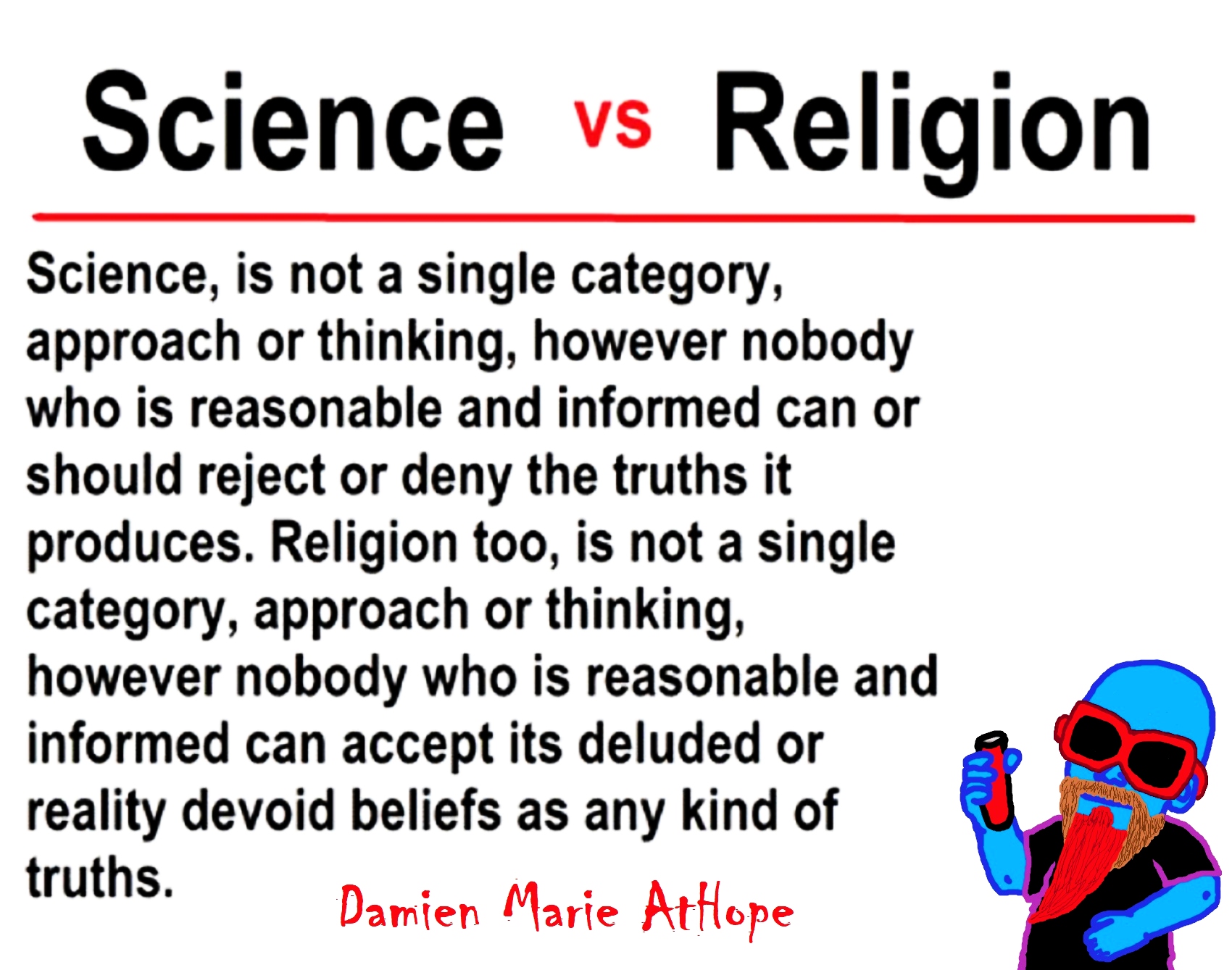
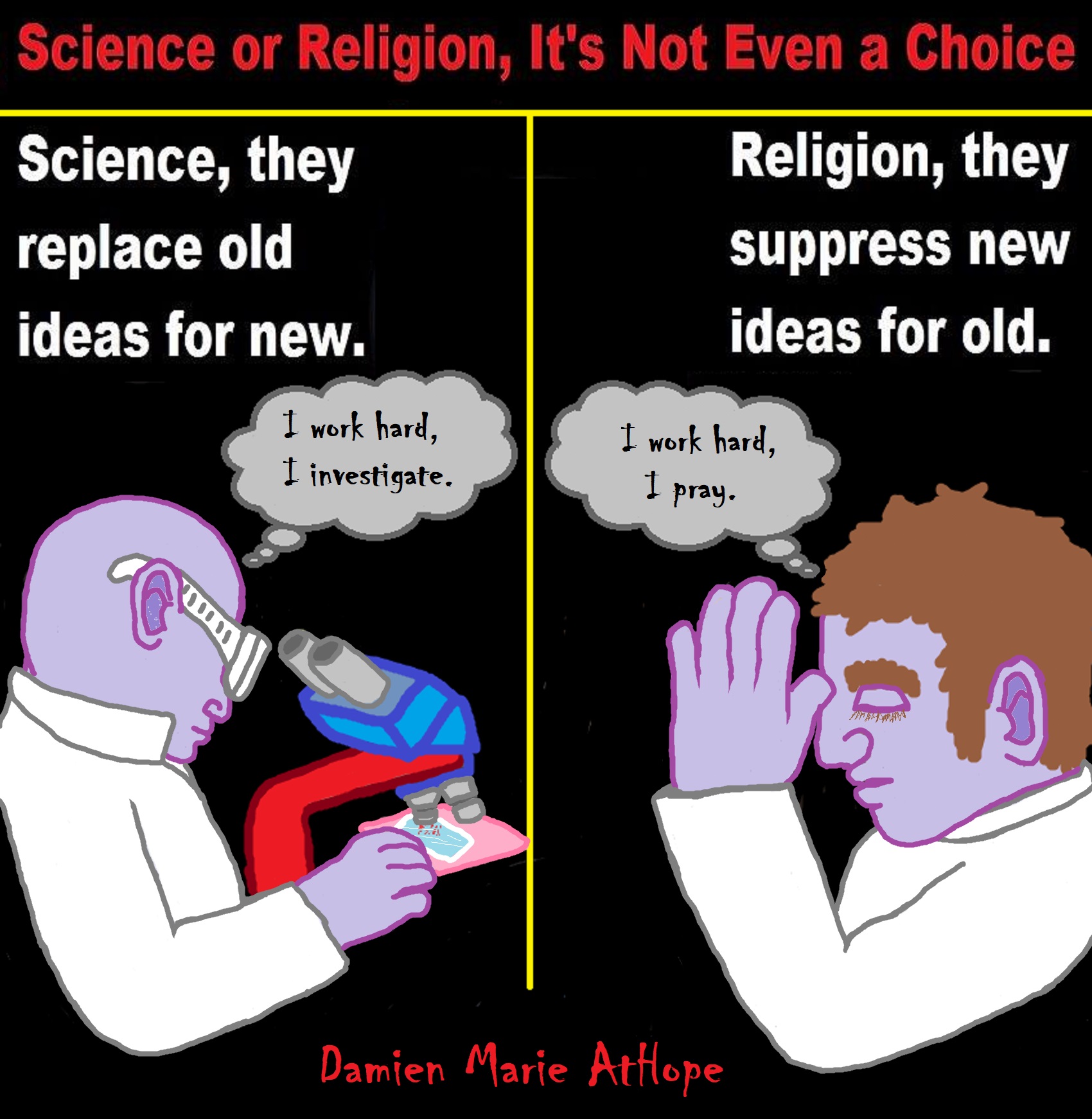

While hallucinogens are associated with shamanism, it is alcohol that is associated with paganism.
The Atheist-Humanist-Leftist Revolutionaries Shows in the prehistory series:
Show two: Pre-animism 300,000 years old and animism 100,000 years old: related to “Anarchism and Socialism”
Show tree: Totemism 50,000 years old: related to “Anarchism and Socialism”
Show four: Shamanism 30,000 years old: related to “Anarchism and Socialism”
Show five: Paganism 12,000 years old: related to “Anarchism and Socialism”
Show six: Emergence of hierarchy, sexism, slavery, and the new male god dominance: Paganism 7,000-5,000 years old: related to “Anarchism and Socialism” (Capitalism) (World War 0) Elite and their slaves!
Prehistory: related to “Anarchism and Socialism” the division of labor, power, rights, and recourses: VIDEO
Pre-animism 300,000 years old and animism 100,000 years old: related to “Anarchism and Socialism”: VIDEO
Totemism 50,000 years old: related to “Anarchism and Socialism”: VIDEO
Shamanism 30,000 years old: related to “Anarchism and Socialism”: VIDEO
Paganism 12,000 years old: related to “Anarchism and Socialism” (Pre-Capitalism): VIDEO
Paganism 7,000-5,000 years old: related to “Anarchism and Socialism” (Capitalism) (World War 0) Elite and their slaves: VIEDO
Paganism 5,000 years old: progressed organized religion and the state: related to “Anarchism and Socialism” (Kings and the Rise of the State): VIEDO
Paganism 4,000 years old: related to “Anarchism and Socialism” (First Moralistic gods, then the Origin time of Monotheism): VIEDO
I do not hate simply because I challenge and expose myths or lies any more than others being thought of as loving simply because of the protection and hiding from challenge their favored myths or lies.
The truth is best championed in the sunlight of challenge.
An archaeologist once said to me “Damien religion and culture are very different”
My response, So are you saying that was always that way, such as would you say Native Americans’ cultures are separate from their religions? And do you think it always was the way you believe?
I had said that religion was a cultural product. That is still how I see it and there are other archaeologists that think close to me as well. Gods too are the myths of cultures that did not understand science or the world around them, seeing magic/supernatural everywhere.
I personally think there is a goddess and not enough evidence to support a male god at Çatalhöyük but if there was both a male and female god and goddess then I know the kind of gods they were like Proto-Indo-European mythology.
This series idea was addressed in, Anarchist Teaching as Free Public Education or Free Education in the Public: VIDEO
Our 12 video series: Organized Oppression: Mesopotamian State Force and the Politics of power (9,000-4,000 years ago), is adapted from: The Complete and Concise History of the Sumerians and Early Bronze Age Mesopotamia (7000-2000 BC): https://www.youtube.com/watch?v=szFjxmY7jQA by “History with Cy“
Show #1: Mesopotamian State Force and the Politics of Power (Samarra, Halaf, Ubaid)
Show #2: Mesopotamian State Force and the Politics of Power
Show #3: Mesopotamian State Force and the Politics of Power (Uruk and the First Cities)
Show #4: Mesopotamian State Force and the Politics of Power (First Kings)
Show #5: Mesopotamian State Force and the Politics of Power (Early Dynastic Period)
Show #6: Mesopotamian State Force and the Politics of Power
Show #7: Mesopotamian State Force and the Politics of Power (Sargon and Akkadian Rule)
Show #9: Mesopotamian State Force and the Politics of Power (Gudea of Lagash and Utu-hegal)
Show #12: Mesopotamian State Force and the Politics of Power (Aftermath and Legacy of Sumer)

The “Atheist-Humanist-Leftist Revolutionaries”
Cory Johnston ☭ Ⓐ Atheist Leftist @Skepticallefty & I (Damien Marie AtHope) @AthopeMarie (my YouTube & related blog) are working jointly in atheist, antitheist, antireligionist, antifascist, anarchist, socialist, and humanist endeavors in our videos together, generally, every other Saturday.
Why Does Power Bring Responsibility?
Think, how often is it the powerless that start wars, oppress others, or commit genocide? So, I guess the question is to us all, to ask, how can power not carry responsibility in a humanity concept? I know I see the deep ethical responsibility that if there is power their must be a humanistic responsibility of ethical and empathic stewardship of that power. Will I be brave enough to be kind? Will I possess enough courage to be compassionate? Will my valor reach its height of empathy? I as everyone, earns our justified respect by our actions, that are good, ethical, just, protecting, and kind. Do I have enough self-respect to put my love for humanity’s flushing, over being brought down by some of its bad actors? May we all be the ones doing good actions in the world, to help human flourishing.
I create the world I want to live in, striving for flourishing. Which is not a place but a positive potential involvement and promotion; a life of humanist goal precision. To master oneself, also means mastering positive prosocial behaviors needed for human flourishing. I may have lost a god myth as an atheist, but I am happy to tell you, my friend, it is exactly because of that, leaving the mental terrorizer, god belief, that I truly regained my connected ethical as well as kind humanity.
Cory and I will talk about prehistory and theism, addressing the relevance to atheism, anarchism, and socialism.
At the same time as the rise of the male god, 7,000 years ago, there was also the very time there was the rise of violence, war, and clans to kingdoms, then empires, then states. It is all connected back to 7,000 years ago, and it moved across the world.
Cory Johnston: https://damienmarieathope.com/2021/04/cory-johnston-mind-of-a-skeptical-leftist/?v=32aec8db952d
The Mind of a Skeptical Leftist (YouTube)
Cory Johnston: Mind of a Skeptical Leftist @Skepticallefty
The Mind of a Skeptical Leftist By Cory Johnston: “Promoting critical thinking, social justice, and left-wing politics by covering current events and talking to a variety of people. Cory Johnston has been thoughtfully talking to people and attempting to promote critical thinking, social justice, and left-wing politics.” http://anchor.fm/skepticalleft
Cory needs our support. We rise by helping each other.
Cory Johnston ☭ Ⓐ @Skepticallefty Evidence-based atheist leftist (he/him) Producer, host, and co-host of 4 podcasts @skeptarchy @skpoliticspod and @AthopeMarie
Damien Marie AtHope (“At Hope”) Axiological Atheist, Anti-theist, Anti-religionist, Secular Humanist. Rationalist, Writer, Artist, Poet, Philosopher, Advocate, Activist, Psychology, and Armchair Archaeology/Anthropology/Historian.
Damien is interested in: Freedom, Liberty, Justice, Equality, Ethics, Humanism, Science, Atheism, Antiteism, Antireligionism, Ignosticism, Left-Libertarianism, Anarchism, Socialism, Mutualism, Axiology, Metaphysics, LGBTQI, Philosophy, Advocacy, Activism, Mental Health, Psychology, Archaeology, Social Work, Sexual Rights, Marriage Rights, Woman’s Rights, Gender Rights, Child Rights, Secular Rights, Race Equality, Ageism/Disability Equality, Etc. And a far-leftist, “Anarcho-Humanist.”
I am not a good fit in the atheist movement that is mostly pro-capitalist, I am anti-capitalist. Mostly pro-skeptic, I am a rationalist not valuing skepticism. Mostly pro-agnostic, I am anti-agnostic. Mostly limited to anti-Abrahamic religions, I am an anti-religionist.
To me, the “male god” seems to have either emerged or become prominent around 7,000 years ago, whereas the now favored monotheism “male god” is more like 4,000 years ago or so. To me, the “female goddess” seems to have either emerged or become prominent around 11,000-10,000 years ago or so, losing the majority of its once prominence around 2,000 years ago due largely to the now favored monotheism “male god” that grow in prominence after 4,000 years ago or so.
My Thought on the Evolution of Gods?
Animal protector deities from old totems/spirit animal beliefs come first to me, 13,000/12,000 years ago, then women as deities 11,000/10,000 years ago, then male gods around 7,000/8,000 years ago. Moralistic gods around 5,000/4,000 years ago, and monotheistic gods around 4,000/3,000 years ago.
To me, animal gods were likely first related to totemism animals around 13,000 to 12,000 years ago or older. Female as goddesses was next to me, 11,000 to 10,000 years ago or so with the emergence of agriculture. Then male gods come about 8,000 to 7,000 years ago with clan wars. Many monotheism-themed religions started in henotheism, emerging out of polytheism/paganism.

Damien Marie AtHope (Said as “At” “Hope”)/(Autodidact Polymath but not good at math):
Axiological Atheist, Anti-theist, Anti-religionist, Secular Humanist, Rationalist, Writer, Artist, Jeweler, Poet, “autodidact” Philosopher, schooled in Psychology, and “autodidact” Armchair Archaeology/Anthropology/Pre-Historian (Knowledgeable in the range of: 1 million to 5,000/4,000 years ago). I am an anarchist socialist politically. Reasons for or Types of Atheism
My Website, My Blog, & Short-writing or Quotes, My YouTube, Twitter: @AthopeMarie, and My Email: damien.marie.athope@gmail.com


